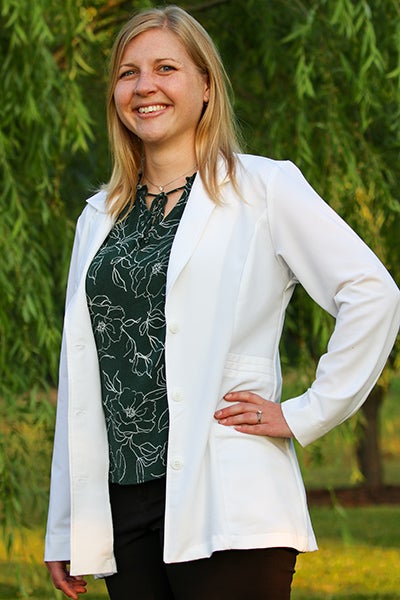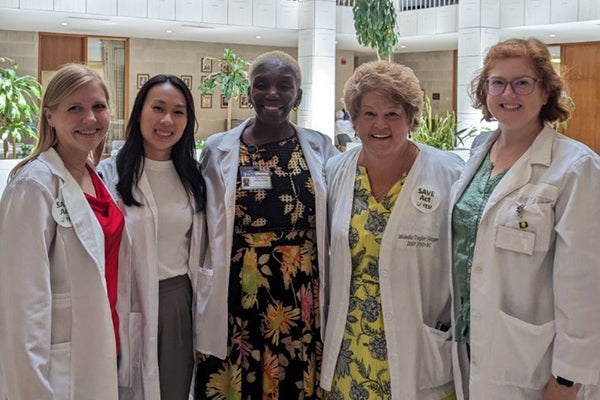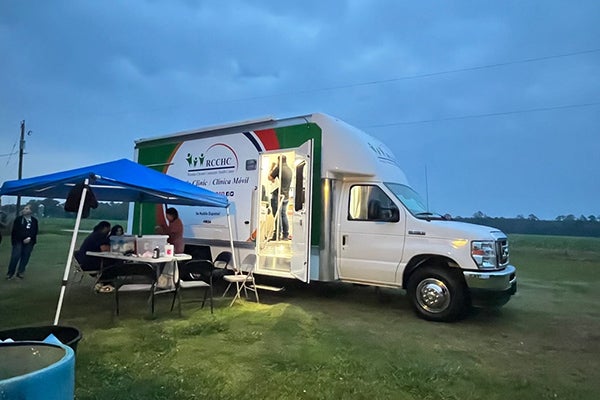ECU nursing student uses language, cultural skills to improve rural health care delivery
The majority of the counties in eastern North Carolina are classified as rural.
While the state saw a downtick in migration overall in recent years, foreign immigrants moving to the Tar Heel state arrive mostly from Spanish speaking countries. The state has an established migrant worker outreach program, but an estimated 150,000 migrant farmworkers face the same rural health disparities as other North Carolinians in addition to the added burdens of language barriers and transportation.

Jesse Baccus, an East Carolina University nursing student, has dedicated her professional life to the medical care of the migrant populations of northeastern North Carolina. (Contributed photos)
Jesse Baccus, a student in East Carolina University’s doctor of nursing practice program, hopes to pair her current job as a nurse in a federally designated rural clinic with her ongoing ECU education to make basic health care available for everyone, particularly those living in rural stretches along the coastal plain.
Becoming a nurse
Baccus, a New Castle, Pennsylvania native, moved to North Carolina to attend UNC-Chapel Hill where she graduated with a bachelor’s degree in psychology and a minor in Spanish. She studied Spanish in college, but she learned it when she lived in Guatemala.
After working as a Spanish interpreter for a few years in a program called Family Connects that offered home visits to mothers and newborns, she returned to the classroom for her Associate Degree in Nursing from College of the Albemarle and a Bachelor of Science in nursing (BSN) from Western Carolina University. Now in the BSN to Doctor of Nursing Practice (DNP) program at ECU, she has experienced the UNC System’s dedication to higher education from one end of the state to the other and has nothing but praise for the education she has received.
Baccus is locked into rural North Carolina now, having married into it. Her husband, whom she met at Chapel Hill, is from a family of commercial fisherman in Hertford, one of the old, small towns that pock the banks of the state’s estuaries like crab trap buoys.
In her current job as a nurse with Roanoke Chowan Community Health Center in Ahoskie, she routinely ventures out of the clinic with her peers to provide health assessments and initial treatment for migrant laborers. The predominantly Spanish-speaking patient population’s language barrier isn’t the only hurdle — the seasonality and transience of the farm workers and their families makes getting, and staying, healthy an added challenge.
“They’re here on a visa and don’t have transportation. Now we have a mobile clinic so we can do an EKG if somebody has shortness of breath or chest pain, which is great,” Baccus said. “We are also going out to follow up, and we can collect lab work so that they don’t have to travel to the clinic. We can go to them.”
Michelle Skipper, director of ECU’s adult-gerontology primary care and family nurse practitioner specialties within the DNP program and one of Baccus’ professors, said graduating motivated primary care providers into communities that need them the most is crucial for North Carolina’s health care future.
“North Carolina in primarily a rural state, and ECU’s DNP program focuses on training providers from rural areas to return to those same rural areas, caring for those they know and love already,” Skipper said.
Migrant outreach
Every DNP student at ECU must complete a capstone project as a requirement for graduation. Baccus is using hers to determine how medical records are managed for migrant workers who live and work in her area of the state. She then plans to expose those patients to the Mediterranean/DASH intervention — a combination of diets low in added sugars and sodium and high in vegetable, health-promoting oils and fiber — which has been shown to reduce hypertension, delay neurodegenerative diseases and improve overall health.
Skipper said that Baccus sets the example of how health care needs to happen to meet the needs of vulnerable and underserved populations.

Baccus, from left, joins fellow BSN to DNP students Anita Ngo, Marie George, Lexie Dillon and faculty lead Michelle Skipper.
“She understands how to reach populations who might not traditionally access health care, chooses to be bilingual for improved communication, and meets her patients where they are. She also uses food and exercise as prescriptions, as much or more than traditional pharmaceutical medications,” Skipper said. “She already understands patient care that happens in communities is as important as when it happens in health care offices.”
Being able to speak to nearly all of her potential patients to provide basic health assessments and introduce health-promoting diets and lifestyle choices unlocks doors of interpersonal connections that are usually closed due to speaking only one language.
“I talk about making good choices either one-on-one with the patient or group, and I’ve found that group sessions are really effective,” Baccus said. “With lifestyle interventions, you’re learning from each other’s successes and failures.”
Another aspect of reducing the impact of metabolic disease is health literacy, which is a tangential project that Baccus is interested in pursuing alongside the diet interventions. Basic health literacy — knowing why the body works the way it does based on inputs like food, outputs like exercise and strategies for balanced mental health — is key to keeping a person on track with a new way of eating and caring for themselves.
Add a language barrier and the complications for health literacy add up quickly.
“That is what drove me back to nursing school. I need to understand when my patient doesn’t get what I’m saying and then communicate with them and keep going until they do understand,” Baccus said. “What’s really driven this project is wanting to provide further education for diabetes prevention or hypertension improvement in this patient population.”
While she can, and does, translate so the providers from her clinic can treat the migrant workers in the multiple counties they cover, the words flow more fluidly for her when she is the one communicating rather than translating.
“It’s actually easier in my brain if I’m the provider and I’m speaking directly to my patient. I am fluent, but it’s easier for me to just speak directly to the patient than be the Spanish interpreter,” Baccus said.
Being able to speak two languages is also helpful for putting migrant patients’ health data into digital health records, a recent initiative for the patient population she sees. The transient nature of migrant work means having a habitual relationship with a primary care provider is nearly impossible, but having longitudinal health data available that can be handed off to the next nurse or doctor means a better chance at improving chronic disease management.
“Something I’m going to work on more this semester with my DNP project is figuring out how we track these patients,” Baccus said. “This is all new to my team; they haven’t been doing a lot of detailed data extracting before now.”
Regardless of the language a patient speaks, rural North Carolina is a tough place to be sick or have a chronic disease, which drives Baccus’ desire to complete her nurse practitioner education.
“Our patients in some parts of North Carolina are limited even in what medical devices are offered to them. In our training, one of the pharmaceutical reps said, ‘Oh, you’re in a white space, none of our reps go out that way,’” Baccus said. “With pregnancy prevention, an IUD could provide eight years of contraception and protection, but our one provider — the only provider who offered IUD placements for 17,000 patients — was out on maternity leave for weeks. It’s impossible for patients to get care.”
Patients often travel more than an hour through field upon field and past the odd low-cost general store to get to the rural clinic.

Baccus and fellow employees at the Roanoke Chowan Community Health Center in Ahoskie conduct an outreach health care event.
Baccus said that her outward appearance — she’s blond with blue eyes — can be jarring at first to the migrant workers she engages in fluent Spanish.
“It’s hilarious to see their face when I speak to them in Spanish. It is more a face of relief. They’re dumbfounded,” Baccus said. “It makes me feel good because it means that they know I’m trying to help them, that they feel seen.”
ECU education, class rep role
As she looks forward to graduation in May 2024, she’s agreed to take on a new role — being the class representative for all BSN to DNP students currently enrolled. As the class representative she will be the voice of her classmates to the faculty and staff at the College of Nursing.
“We’re all across the state and we come to campus once a semester for three or four days,” Baccus said, which makes having a single point of contact who can channel student concerns to the faculty necessary.
While Baccus says that she doesn’t have a lot of formal leadership experience, she hopes this opportunity will help her to build a skillset that will ready her for the demands of health care outreach in rural communities.
Being a voice for others, whether as a nurse at her job or in the classroom, is a responsibility she is eager to accept.
“I have a lot of goals and dreams about making health care better for my community. I want to grow in that role, so I’m hopeful that I will be able to use this representative position as a safe opportunity to learn how to be the leader I need to be,” Baccus said.
Related
Migrant Farmworker Literacy
Healthy Farmworkers